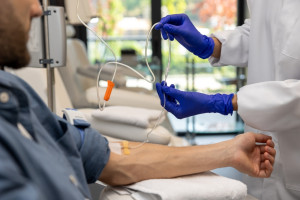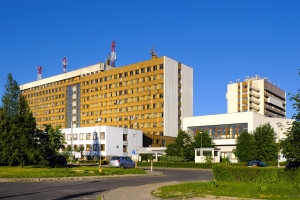Many parents don't want to see mental illness in their children. The consequences are serious.

- Schizophrenia most often appears between the ages of 16 and 28, although it can also occur earlier.
- Early psychotic symptoms affect approximately 79,000 young people, but diagnosis is often delayed due to heterogeneity of symptoms, misdiagnosis, or stigma.
- Awareness among parents, educators, and primary care physicians remains limited. Family support structures are eroding, as many parents are unable or unwilling to recognize their children's psychological needs.
- Meanwhile, prolonged duration of untreated psychosis is the most important prognostic factor
- How to counteract the negative phenomena associated with schizophrenia in the report "Rethinking schizophrenia. A new look at schizophrenia in Poland. The relationship between schizophrenia and brain health"
Schizophrenia is increasingly being viewed as a neurodevelopmental brain disorder that most often manifests between the ages of 16 and 28, although it can also occur earlier. It affects 200,000–400,000 people in Poland, with approximately 16,000 new cases reported each year, according to the report "Rethinking Schizophrenia. A New Look at Schizophrenia in Poland. The Link Between Schizophrenia and Brain Health."
Early psychotic symptoms affect approximately 79,000 young people, yet diagnosis is often delayed due to heterogeneity of symptoms, misdiagnosis, or stigma. Dual diagnoses (e.g., psychosis and substance use, or psychosis and posttraumatic stress disorder (PTSD)) complicate care.
There is still limited awareness among parents, educators, and primary care physicians. We are witnessing an erosion of family support structures, as many parents are unable or unwilling to recognize their children's psychological needs and respond appropriately—especially in situations involving violence, neglect, or dysfunctional family dynamics.
Prolonged duration of untreated psychosis (DUP) is the most important prognostic factor, as longer DUP is associated with greater neurobiological damage and poorer psychosocial outcomes. This highlights the importance of identifying high-risk states and taking prompt action to prevent progression to first-episode psychosis (FEP). Hospitalization should be the last resort in managing psychiatric crises.
Effective intervention depends on early detection, prompt treatment, especially in the prodromal phase (when subtle symptoms emerge, e.g., social withdrawal, cognitive decline, or mood changes), and community care.
Pharmacotherapy, including long-acting injectable antipsychotics, is currently reimbursed in Poland, although off-label use in adolescents remains common due to the lack of pediatric approvals. Non-pharmacological interventions, such as psychotherapy, psychoeducation, rehabilitation, and family support, are crucial but inconsistently available.
Continuity of care and transition between child and adult mental health services are underdeveloped, leading to disruptions in service delivery during adolescence. The need for system-wide coordination and transition pathways (e.g., protocols) could be facilitated by shared electronic health record systems. Finally, meaningful peer support and family engagement are key components of crisis prevention and management, reinforcing the need for a holistic, recovery-oriented approach throughout the care process.
Fixing Psychiatry - Steps in the Right DirectionPoland has two separate psychiatric systems: one for adults and the other for children and adolescents. Since 2018, comprehensive reforms have been continuously implemented. This was reflected in the reform: changes in child and adolescent psychiatry and adult psychiatry were treated as two separate processes, regulated differently by law.
The reform of adult psychiatry focuses on deinstitutionalization and pilot programs for community-based mental health care.
Despite the reforms, access to timely diagnosis remains uneven. In the pilot regions (representing 50% of Poland), access to mental health and support services has improved, with most urgent cases resolved within 72 hours. However, outside these regions, waiting times can exceed five months.
For children and adolescents in Poland, there is a three-tier model for providing mental health services, organised according to the intensity and complexity of their needs:
- Level I: Center for Community Psychological and Psychotherapeutic Care for Children and Youth,
- Level II: Mental Health Center for Children and Youth,
- Level III: Centers of highly specialized 24-hour psychiatric care.
The three-tiered care reform has improved access to care, shortened hospital stays, and aims to reduce regional disparities. However, significant challenges remain, including infrastructure gaps (such as a lack of dedicated community care spaces), staffing shortages, and ineffective information exchange—both within the healthcare sector (e.g., between public and private healthcare facilities) and across sectors such as health, education, social services, and justice.
The implementation of Mental Health Centers (MHCs) and a multi-tiered model of mental health care for children and adolescents are important steps toward improving the system. Despite these changes, the care system still faces significant gaps and challenges:
- Insufficient coordination between child and adolescent psychiatric care and the adult system makes it difficult to ensure continuity of treatment.
- Access to early diagnosis and evidence-based treatment is uneven, with persistent regional disparities and strong stigma.
- Peer support and family engagement are under-represented in care pathways and are under-funded, despite their proven benefits.
- Structural constraints on the integration of psychiatric, educational and social services persist, especially among adolescents and young adults.
To strengthen the mental health system and ensure continuity of support—especially for young people—a shift toward more integrated, community-based, and patient-centered models of care is essential. The following priorities outline key strategic directions for creating more resilient, equitable, and brain-informed mental health services across Poland.
Developing a coherent, multidisciplinary brain health pathway that encompasses the entire process from early symptoms to long-term recovery, with a focus on prevention and key transitions between levels of care.
Include the participation of people with crisis experience (e.g. recovery assistants) and families in the psychiatric care system – so that it becomes a recognized, routine and integral element of the overall support model.
Expanding and integrating community services across all regions.
Promoting educational campaigns to reduce stigma and increase knowledge about mental health.
Ensuring sustained investment in digital health tools such as telemedicine and ensuring reimbursement for innovative therapies.
About the reportThe report (full text attached) is a follow-up to the recommendations contained in the European Brain Council (EBC) research document “Rethinking Schizophrenia Care Pathway in Europe”.
Three countries: Poland, Denmark and Germany were selected for the initial development of country profiles to analyse the actual situation of national mental health systems based on strategic, geographical and political factors, including upcoming European Union (EU) presidencies, health system strengths and opportunities for policy dialogue.
On June 5, 2025, a roundtable was held in Warsaw devoted to improving the quality of mental health care for children and adolescents, with particular emphasis on brain health and schizophrenia.
The next stage of the project includes an in-depth analysis of the current state, challenges and future directions of development of mental health care, and more specifically the treatment of schizophrenia, at the national level.
In spring 2026, an EBC Insights Paper will be published, based on systemic analyses in selected countries, identifying the main challenges and presenting specific policy directions to strengthen the national and European response to the mental health needs of young people.
Copyrighted material - reprint rules are specified in the regulations .
rynekzdrowia












